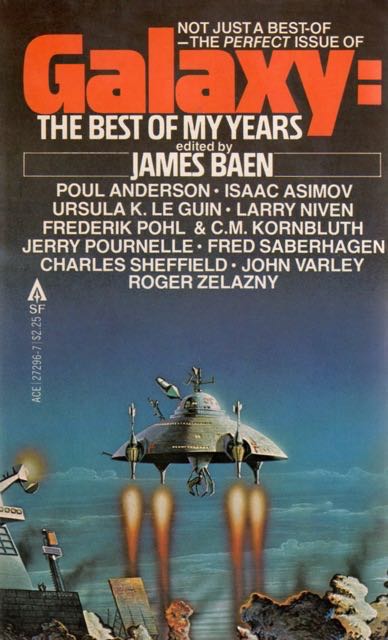Galaxy: The Best of My Years
edited by James Baen
Reviewed date: 2006 Feb 12
517 pages
Reviewed date: 2006 Feb 12
517 pages
- The Day Before the Revolution, by Ursula K. Le Guin - Nebula winner, Hugo nominee. An old woman whose prison writings started the revolution reflects on her life after her stroke. She feels old and useless.
- The Gift of Garigolli, by Frederik Pohl and C. M. Kornbluth - A plastics man owes $14,752.03 on a note his wife co-signed for her brother; minute alien watchers secretly try to help him, as their Directive Two commands them to help people.
- Birthdays, by Fred Saberhagen - Bart is in deep sleep on a space ship, awakened once a year to provide parenting for a group of 24 colonists. But strangely, as the colonists grow up, grow old, and die, Bart is still awakened only once a year.
- Overdrawn at the Memory Bank, by John Varley - When Fingal takes a virtual reality vacation as a lion in Kenya, the company loses his body and he can't return to the real world.
- The Long Chance, by Charles Sheffield - Drake Merlin's wife Ana has an incurable disease, so he puts her into cryosleep, takes ten years to prepare for the future and then goes into cryosleep himself, hoping that someday she can be cured and they will be reunited.
- Down and Out, by Larry Niven - Corbell, persecuted non-citizen of The State, steals a ramship and flies it to the center of the galaxy, with the ship's computer as his only companion.
- The Game of Blood and Dust, by Roger Zelazny - Blood and Dust play games with the history of the world, influencing critical events to achieve an outcome of humanity's life or death.
Nonfiction essays:
- The Myth of the Light Barrier, by James Baen - A relativistic universe is a much nicer place than a Newtonian one would be: it only takes 20 years at 1 g to reach the center of the galaxy.
- Is There Hope for the Future, by Isaac Asimov - A 1974 essay describing a Western, American-style liberal future: the only hope for humanity is population control, energy conservation, world government, an end to sexism and racism, and the fact that wars become so expensive they price themselves out of existence. The good doctor swallowed a bit too much liberal propaganda--but it's easy to say this in hindsight.
- Our Many Roads to the Stars, by Poul Anderson - A brief discussion of various methods of interstellar travel, focusing mostly on ramjets and the effects of relativity.
- That Buck Rogers Stuff, by Jerry Pournelle - We may be ruining the world, but science and technology will give us the galaxy.
- Galaxy and the Galaxy, by James Baen - A dated essay discussing the malaise that permeates 70s science fiction.
